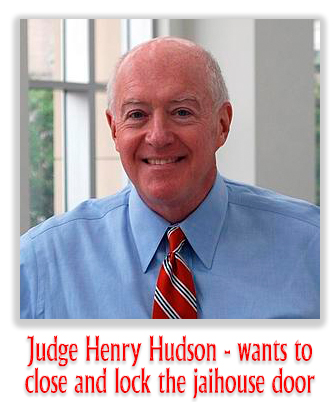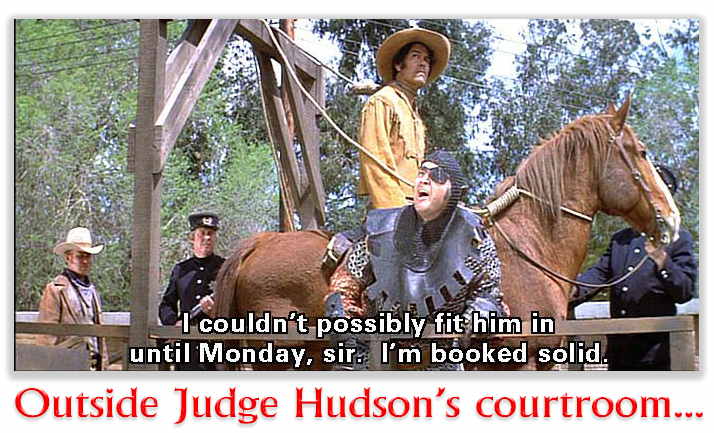We post news and comment on federal criminal justice issues, focused primarily on trial and post-conviction matters, legislative initiatives, and sentencing issues.
HANG ‘EM HIGH HUDSON
The United States Sentencing Commission, a 7-member judicial agency charged with writing and amending the federal sentencing guidelines faced a manpower crisis earlier this year, as only two voting members remained. The Senate increased that number to the minimum needed for a quorum by approving two Obama holdover nominations in March.
Nevertheless, the shortage of a voting quorum for three months left the Commission unable to assemble a slate of sentencing guidelines amendments for 2017. To get the Commission back to fighting trim will require three more commissioners be appointed by President Trump and approved by the Senate.

Enter everyone’s favorite compassionate conservative, Attorney General Jefferson Beauregard Sessions III. Sessions yesterday urged the White House to nominate federal judge and ex-prosecutor Henry E. Hudson to the Commission. Judge Hudson, who as a prosecutor was nicknamed “Hang ’Um High” Henry Hudson and said he lived to put people in jail, earned fame as a prosecutor for railroading a developmentally disabled man into prison for a rape he didn’t commit. Hudson’s successor exonerated the man when inconsistencies in the case led detectives to pursue other leads, ultimately linking a serial killer to the murder. Faced with the evidence that he had convicted the wrong guy, Hudson wrote in his memoirs, “I certainly wish him the best, and regret what happened. However, I offer no apologies.”
 At the same time, Sessions is urging the commission to toughen sentences for certain violent criminals, drug offenders, illegal immigrant smugglers and so-called career offenders. In public comments filed with the Sentencing Commission on July 31, the Dept. of Justice asked it to preserve mandatory-minimum sentences that supporters say help fight crime but critics say inflate prison costs and disproportionately hurt minority communities without improving public safety.
At the same time, Sessions is urging the commission to toughen sentences for certain violent criminals, drug offenders, illegal immigrant smugglers and so-called career offenders. In public comments filed with the Sentencing Commission on July 31, the Dept. of Justice asked it to preserve mandatory-minimum sentences that supporters say help fight crime but critics say inflate prison costs and disproportionately hurt minority communities without improving public safety.
 DOJ also encouraged the Commission to abandon the categorical approach (Mathis v. United States) for determining which state crimes are crimes of violence supporting much higher sentencing ranges for “career offenders.” The Department complains that the “categorical approach,” which requires courts to “focus solely on whether the elements of the crime of conviction sufficiently match the elements of a generic version of the crime,” focuses on the abstract elements of the statute “and largely ignores the conduct that the defendant actually committed. This approach has resulted in some repeat violent offenders… receiving a sentencing range that is lower than their conduct and criminal history warrant. The categorical approach also consumes an inordinate amount of time for trial court judges, appellate court judges, probation officers, prosecutors, and defense attorneys.”
DOJ also encouraged the Commission to abandon the categorical approach (Mathis v. United States) for determining which state crimes are crimes of violence supporting much higher sentencing ranges for “career offenders.” The Department complains that the “categorical approach,” which requires courts to “focus solely on whether the elements of the crime of conviction sufficiently match the elements of a generic version of the crime,” focuses on the abstract elements of the statute “and largely ignores the conduct that the defendant actually committed. This approach has resulted in some repeat violent offenders… receiving a sentencing range that is lower than their conduct and criminal history warrant. The categorical approach also consumes an inordinate amount of time for trial court judges, appellate court judges, probation officers, prosecutors, and defense attorneys.”
 DOJ argues that “the time has come to abandon the categorical approach in those cases involving the enumerated felonies clause. The Department would be pleased to work with the Commission to develop a workable and fair approach that focuses less on formalism and more on the defendant’s conduct.”
DOJ argues that “the time has come to abandon the categorical approach in those cases involving the enumerated felonies clause. The Department would be pleased to work with the Commission to develop a workable and fair approach that focuses less on formalism and more on the defendant’s conduct.”
Of course it would. And Judge Henry “Hang ‘Em High” Hudson is just the kind of commissioner with whom DOJ would like to work.
Dept. of Justice, Response to Request for Public Comment, Proposed Priorities for Amendment Cycle, 82 FR 28381(filed July 31 2017)
Wall Street Journal, Sessions Promotes Tough-On-Crime Judge for Sentencing Panel (Aug. 10, 2017)
– Thomas L. Root

